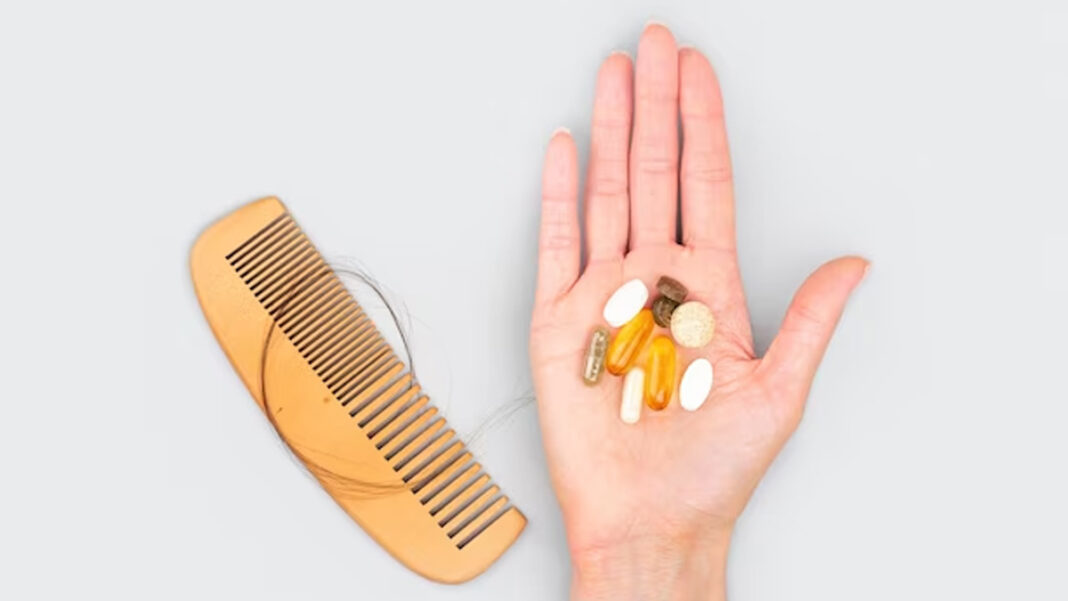Our hair plays a vital role in defining our personality. The more luscious, shinier, and thicker they are, the greater our confidence and self-esteem. But unfortunately, a large population of both men and women struggles with hair loss and slow hair growth in today’s time. This could be attributed to various factors, from lifestyle to genetics to underlying medical conditions. But with more and more people talking about their experiences, the market for hair supplements has also increased over the years. However, the real question is: are they effective and safe to take? The OnlyMyHealth team spoke to Dr Ravi Chander, Consultant Plastic Surgeon and Trichologist, CARE Hospitals, Banjara Hills, Hyderabad, to get some answers. Also Read: Your Hair Loss May Be Due To Magnesium Deficiency: Here’s How To Handle It Factors That Affect Hair Growth “Hair growth occurs under the influence of different factors such as biological, environmental, and lifestyle factors,” says Dr Chander, adding that it is influenced by genetic determinants, age, and hormone levels, with conditions like thyroid disorders and alopecia also having an impact on it. Research suggests men aged 40–55 experience vertex or full baldness at a 31% rate, rising to 53% by 65–69. Receding hairlines also become more frequent, affecting 25% of men in their 40s and 50s and 31% in their 60s and 70s. Genetics also has a big role to play in hair health. Dr Chander says, “If your family has a history of thin hair or slow growth, you also inherit those traits. Your genes can also determine how you respond to hormones that regulate hair growth. Androgenic alopecia, also known as pattern baldness, is a hereditary condition where the process of hair growth is slowed down and hair follicles begin to shrink over time.” Therefore, understanding one’s genetic predisposition can help one manage their expectations for their hair growth and give direction on what treatments or changes in lifestyle are required for healthier strands of hair, he advises. In addition, nutritional deficiencies and other environmental elements, such as extreme temperatures, pollution, and hard water, can also cause a major setback to hair health, the doctor adds further. ‘Lifestyle Changes Are Critical’ When it comes to overall health, including your hair health, a healthy diet rich in vital nutrients plays a crucial role. According to Dr Chander, poor dietary choices, high stress levels, and bad hair care practices, such as excessive use of styling tools or chemicals, can all harm hair and lead to slowed growth. In addition, certain medications, smoking, and excessive alcohol intake can hinder proper hair development, he adds. Hair-Growth Supplements: Do They Work? As far as hair supplements are concerned, Dr Chander is of the opinion that they can be successful but may vary within individuals depending on nutritional gaps and general health. He says, “Components such as biotin, vitamin D, folic acid, and zinc, along with vitamins and minerals that are needed for healthy hair growth, are present in it. Taking these in case someone has a deficiency of any of them could help improve hair vitality and growth.” “Nevertheless, it depends on the quality of the supplement as well as one’s condition. While most people will notice an improvement, others may not see any significant differences at all,” he adds, recommending choosing recognised brands that have been tested by third parties to ensure that they are safe. Additionally, he advises speaking with a healthcare provider before beginning supplementation because they can advise about interactions with drugs or underlying conditions. Excessive ingestion of certain vitamins and minerals may have harmful effects, thus necessitating expert guidance, he emphasises. Also Read: Ingredients That Prevent Hair Fall And Promote Hair Growth As Per A Dermatologist Natural Remedies To Try If you’re not a fan of supplements, then there are natural ways to enhance hair growth. These include: A well-balanced diet consists of vitamins such as vitamins A, C, D, and E, iron, omega-3, zinc, fatty acids, and proteins. These nutrients can be found in eggs, nuts, dark leafy vegetables, or fish, among other foods. Eating biotin-rich foods, mostly found in eggs and whole-grain products,. Using mild shampoos, regular conditioning, and avoiding too much heat from styling tools. Doing regular scalp massages with oils like coconut oil, olive oil, or castor oil would increase blood circulation, leading to growth. Cleaning and exfoliating the scalp, which would prevent clogged follicles. Stress management through yoga exercises or meditation practices. Adequate sleep is 7-8 hours per night. Drinking plenty of water will keep your body hydrated and maintain the moisture content and strength of your hair. Conclusion Hair growth supplements can offer various benefits for improving hair health and promoting growth, especially because they contain essential vitamins, minerals, and natural extracts. However, the results may vary depending on individual health and overall wellness. It is always best to speak to and consult with a healthcare professional before starting any supplement regimen. Moreover, a balanced diet, proper hair care, and addressing underlying health issues can be a more natural way to tackle hair problems.Read NextAre There Any Foods That Can Trigger Receding Hairline? Read On Disclaimer All possible measures have been taken to ensure accuracy, reliability, timeliness and authenticity of the information; however Onlymyhealth.com does not take any liability for the same. Using any information provided by the website is solely at the viewers’ discretion. In case of any medical exigencies/ persistent health issues, we advise you to seek a qualified medical practitioner before putting to use any advice/tips given by our team or any third party in form of answers/comments on the above mentioned website.
